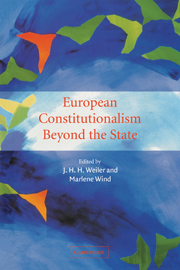Book contents
- Frontmatter
- Contents
- Notes on contributors
- Introduction: European constitutionalism beyond the state
- Part I
- Part II
- Part III
- 6 Beyond representative democracy: constitutionalism in a polycentric polity
- 7 Finality vs. enlargement: constitutive practices and opposing rationales in the reconstruction of Europe
- Epilogue: europe and the dream of reason
- Index
- References
7 - Finality vs. enlargement: constitutive practices and opposing rationales in the reconstruction of Europe
Published online by Cambridge University Press: 26 June 2009
- Frontmatter
- Contents
- Notes on contributors
- Introduction: European constitutionalism beyond the state
- Part I
- Part II
- Part III
- 6 Beyond representative democracy: constitutionalism in a polycentric polity
- 7 Finality vs. enlargement: constitutive practices and opposing rationales in the reconstruction of Europe
- Epilogue: europe and the dream of reason
- Index
- References
Summary
Introduction
[I]n the coming decade we will have to enlarge the EU to the east and south-east, and this will in the end mean a doubling in the number of members. And at the same time, if we are to be able to meet this historic challenge and integrate the new member states without substantially denting the EU's capacity for action, we must put into place the last brick in the building of European integration, namely political integration. The need to organize these two processes in parallel is undoubtedly the biggest challenge the Union has faced since its creation …
Crucial as the [2000] intergovernmental conference is as the next step for the future of the EU, we must, given Europe's situation, already begin to think beyond the enlargement process and consider how a future ‘large’ EU can function as it ought to function and what shape it must therefore take … Permit me therefore to remove my Foreign Minister's hat altogether in order to suggest a few ideas both on the nature of this so-called finality of Europe and on how we can approach and eventually achieve this goal.
(German Foreign Minister Joschka Fischer, Humboldt University, Berlin, 2000)The issue of compliance in the international system of states, on the one hand, and why citizens obey the law, on the other, follow different trails of philosophical reasoning.
- Type
- Chapter
- Information
- European Constitutionalism beyond the State , pp. 157 - 201Publisher: Cambridge University PressPrint publication year: 2003
References
- 2
- Cited by



